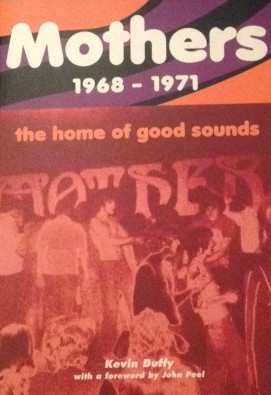Inspiring Older Readers
 posted on 27 Jan 2016
posted on 27 Jan 2016
Mothers 1968 – 1971 : the home of good sounds by Kevin Duffy
I’m fully prepared to accept that this one is a bit niche but sometimes nostalgia just gets the better of good judgement. Kevin Duffy’s Mothers 1968 – 1971 is a glorious little time capsule for anyone who remembers the days of army greatcoats, enormously flared jeans, long hair on men and the odd mix of patchouli oil and dope that wafted around gigs and coffee bars. Maybe for those who have attempted to protect their sanity by blocking out details of those fashion crimes or who didn’t inhale, the music might be the best way into the heady three years of the Mothers nightclub in Erdington, Birmingham.
At this time any self-respecting band playing ‘heavy rock’ or ‘underground’ music would roll up to Mothers – situated above a furniture shop on Erdington High Street in suburban Birmingham in a nightclub which had once been known as The Carlton Club. Influenced by the 60s alternative culture and by the Woodstock hippie generation, the owners of the Carlton changed the name and the band booking policy and inadvertently spawned a legend. Over that short period of time in the late Sixties this comparatively modest venue hosted the likes of Jethro Tull, Led Zeppelin, Fleetwood Mac, Pink Floyd, King Crimson, Van Morrison and many more that would go on to be future stadium fillers.
Duffy’s delightful A4 booklet, published by the Birmingham Library Service, takes us back to the time when all this felt genuinely significant. I only went once late in 1970 to see The Edgar Broughton Band and, if truth be told, didn’t think too much of it. What I didn’t really know was that its moment had come and gone and I was only getting a last look at what had been almost a place of pilgrimage for young men and women intoxicated by the ideas of an alternative cultural experience. Mothers closed only a few months after my visit – but I don’t think I can be blamed for that.

Duffy’s homage has a preface written by John Peel whose memories of the place were clearly affectionate and they’ve tried to use a spirit-of-the-time psychedelia on the pages that set out the history of the club. In the middle there is a lovely week by week diary of all the acts that visited – some of them several times over the years. You’ll be genuinely astonished at just which mega-stars found themselves in Erdington on a wet Tuesday evening.
The book provides more than just a warm dose of reminiscence because it fills a genuine need for local history to preserve these windows of time that would otherwise close on a bit of the past that now feels so far away that it’s being viewed through the wrong end of the telescope.
Terry Potter
January 2016



